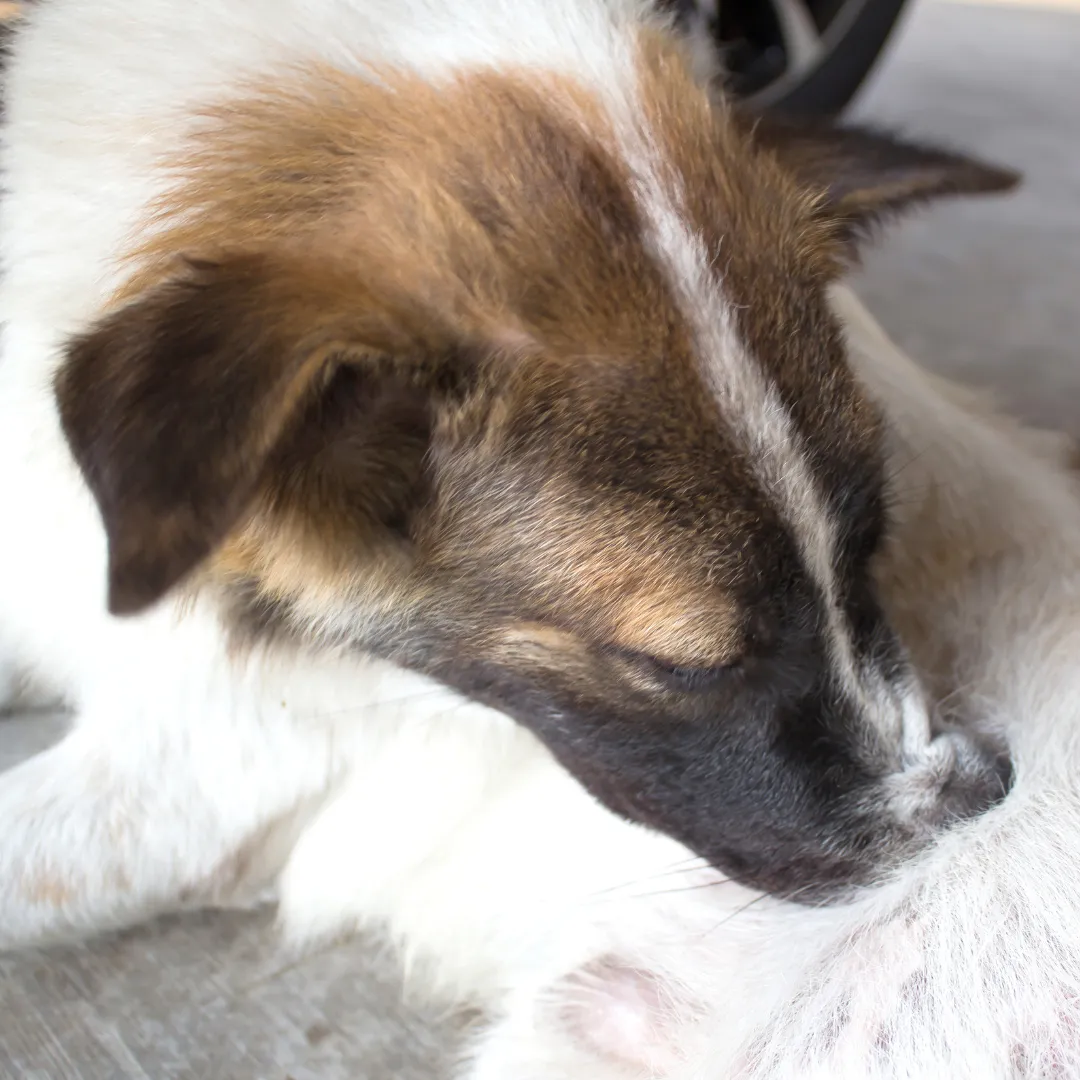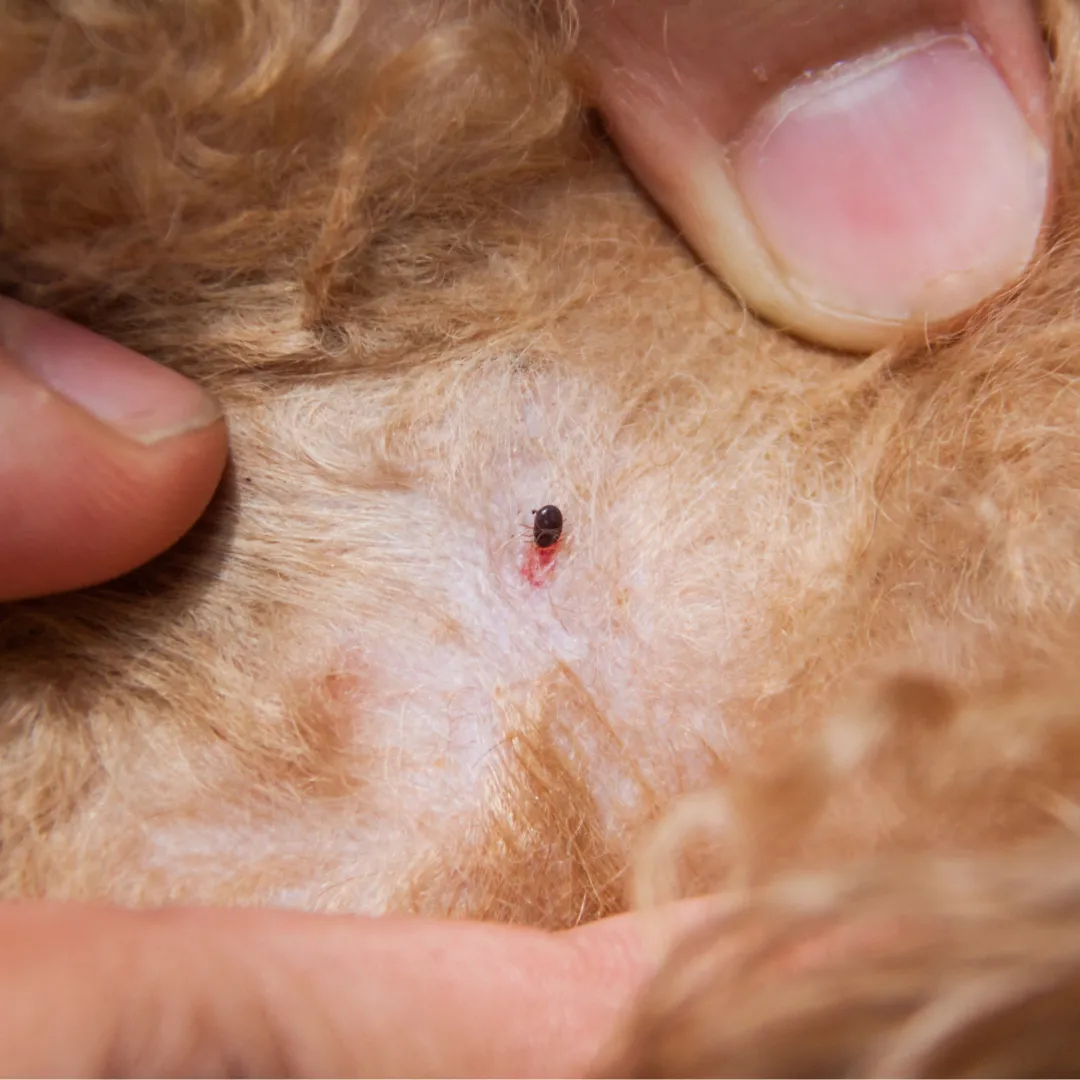Fleas are unwelcome guests that frequently torment our beloved canine companions, leading to countless visits to the vet and distress for dog owners. These resilient parasites reproduce rapidly, finding sanctuary in every hidden corner both indoors and out. Upon contact with a dog, they quickly latch on, feeding on their blood. While numerous treatments exist, many are laden with chemicals that can pose risks to your dog’s health or the environment. This article delves into the most effective All Natural Flea And Tick Killer methods, ensuring you and your dog can enjoy a truly pest-free environment.
Identifying Fleas and Ticks on Your Dog
Flea bites often result in irritation and relentless itching. If you observe your dog scratching excessively, notice bumps on their skin, or significant hair loss, there’s a high probability they have fleas. Flea allergy dermatitis is a prevalent condition among pets, but more severe health issues can arise. Some dogs may develop anemia or tapeworms if they ingest fleas, while Bartonellosis, a bacterial infection, has also been linked to fleas, manifesting as nausea, fever, an irregular heartbeat, and loss of appetite. Identifying ticks can also involve feeling small bumps on your dog’s skin, especially after outdoor activities. Early detection of both is crucial for effective treatment.
Where Fleas and Ticks Thrive
Fleas flourish in warm, humid climates, preferring temperatures between 70 – 85°F and approximately 70% humidity, according to PetMD. However, fleas are averse to direct sunlight, a vulnerability that can be exploited for preventative measures against these persistent parasites. In 2012, data from the Banfield Pet Hospital in Birmingham highlighted Alabama, Florida, Georgia, Louisiana, Oregon, South Carolina, Texas, and Washington as states with the highest flea infestations. These regions can experience year-round flea activity, whereas states like Arizona and Utah are comparatively less affected. Ticks also prefer specific environments, commonly found in tall grass, wooded areas, and leaf litter, patiently waiting to attach to a host. Understanding these habitats is key to effective prevention.
Effective All Natural Flea and Tick Killer Remedies for Dogs
The good news is that numerous natural approaches exist to eliminate fleas and ticks without resorting to harsh chemicals. From soothing baths and specialized dips to topical rubs and collars, there are home remedies and natural solutions for dogs of all dispositions. For general wellness, it’s always good to consider holistic approaches, even for issues like canine upset stomachs; for instance, understanding a natural remedy for dog diarrhea can be beneficial.
Apple Cider Vinegar: A Natural Repellent
One of the most effective all natural flea and tick killer remedies for dogs is apple cider vinegar. This home remedy can even be used without a full bath! Fleas dislike acidic environments, and apple cider vinegar, being acidic, helps balance the pH levels on your dog’s skin and fur, creating an inhospitable environment for fleas with minimal impact on your dog.
You can utilize apple cider vinegar as a homemade flea and tick spray for dogs or incorporate it into their drinking water. To prepare the spray, mix six cups of apple cider vinegar with four cups of water. Add a pinch of sea salt, then pour the mixture into a spray bottle. Shake well and thoroughly spray your dog’s coat, being careful to avoid the eye area. Alternatively, adding a couple of spoons of apple cider vinegar (or any vinegar of your choice) to your dog’s drinking water can help eliminate any ingested fleas. Remember to introduce a small amount initially to ensure your dog continues to drink water willingly. For a different type of canine discomfort, some pet owners might look into the best anti diarrhea medicine for dogs for quick relief.
Lemon: The Citrus Solution
Lemon offers another excellent all natural flea and tick killer solution, similar to apple cider vinegar. This highly acidic fruit is beneficial for your dog but spells trouble for fleas and ticks. Lemons are readily available, simple to use, and impart a refreshing, citrusy fragrance to your dog’s coat.
Create a lemon bath by combining half a cup of freshly squeezed lemon juice with two cups of water. Add this mixture to your dog’s regular bath, washing your canine friend with your usual natural pet soap or shampoo. Alternatively, you can dip your dog’s comb in lemon juice and brush through their fur. If your dog has very short hair, a cloth soaked in lemon juice can be used to wipe them down, achieving the same effect. Another effective use for lemon is to boil thin lemon slices, allow the mixture to cool overnight, and then spray it over soft furnishings to deter fleas and ticks in your home. This serves as a great homemade flea and tick spray to keep handy.
 Dog biting at a flea, indicating discomfort and the presence of parasites
Dog biting at a flea, indicating discomfort and the presence of parasites
Potent Essential Oils for Flea and Tick Control
Essential oils have gained widespread popularity among humans, and their efficacy extends to our furry friends as well. A variety of essential oils can repel fleas and ticks, with some being potent enough to act as an all natural flea and tick killer.
Due to their potency, essential oils can be dangerous if applied directly or ingested. It is crucial to always dilute them with a carrier oil such as coconut oil, avocado oil, or another carrier oil of your choice. You can also dilute them with water in a glass container and shake thoroughly before use. Never add essential oils to your dog’s drinking water. Essential oils that serve as effective repellents include lavender, rose geranium, lemongrass, and rosemary essential oil. Add a few drops of any of these to your dog’s natural shampoo or mix with water and a carrier oil in a glass spray bottle. Spray the mixture onto the back of your dog’s neck, taking care to avoid their eyes and ears. It’s important to apply this in a spot your dog cannot easily lick, as ingesting some essential oils can cause an upset stomach or, in severe cases, toxicity. Remember, essential oils are very potent, so a little goes a long way. For other digestive concerns, a dog diarrhea medicine petsmart might be an option to discuss with your vet.
You can also craft a lavender or cedar oil collar by dipping your dog’s collar (whether homemade or store-bought) in water infused with a few drops of the chosen essential oil, letting it dry, and then placing it on your dog.
Coconut Oil and Neem Oil: Dual-Action Protection
Continuing with natural oils, rubbing coconut oil all over your dog can effectively repel fleas and ticks, while also leaving their coat shiny and luxurious. Unlike many essential oils, coconut oil is safe for ingestion. You can add a small amount to your pet’s food, as it also possesses antibacterial properties.
Neem oil is another fantastic option. Mix it with water and spray it on affected areas to alleviate itchiness. While not toxic when ingested, it has a strong, unpleasant taste that dogs generally dislike. If your dog experiences digestive issues, finding a suitable dog medicine for loose motion can be vital for their comfort and health.
Natural Baths and Dips for Immediate Relief
Baths and dips are an excellent all natural flea and tick killer strategy, especially for dogs who enjoy water. Use organic soaps and natural shampoos to thoroughly clean your dog. Adding a few drops of essential oil to the shampoo or bath water can provide an extra boost of flea and tick repellent power.
You can also prepare a rosemary dip by steeping rosemary leaves in boiling water for several minutes. Strain the water and dilute it with warm water until it reaches a comfortable, non-scalding temperature. Allow your dog to splash around in this natural treatment. It’s a fun and effective way to treat your dog for fleas and ticks. Ensure your pup doesn’t drink the dip. When considering other health problems, a veterinarian can help identify the best medicine for dog loose motion.
 A close-up image of a flea on a dog's fur, highlighting the need for effective treatment
A close-up image of a flea on a dog's fur, highlighting the need for effective treatment
Environmental All Natural Flea and Tick Killer Prevention
Treating your dog for fleas and ticks is only half the battle. If your dog has these pests, there’s a high likelihood that your home and yard have become breeding grounds. Here are several natural methods you can use to eliminate them from your environment.
DIY Flea Traps
Flea traps offer a simple method for effective pest control. Just add a small amount of dishwashing soap to a bowl of warm water and place it on the floor overnight. The mixture creates a highly viscous, sticky surface for fleas. In the morning, dispose of the water and thoroughly wash the bowl.
Diatomaceous Earth: A Powerful Desiccant
Derived from the fossilized remains of algae, this fine white powdery substance is an incredible all natural flea and tick killer. Sprinkle an even layer on your carpets or floors, paying particular attention to areas your dog frequently uses. Leave it undisturbed for approximately 48 hours (block off the area if possible), then vacuum it up. Diatomaceous earth dehydrates flea and tick eggs, preventing future infestations. This is a crucial natural flea and tick treatment for dogs and their environment that you shouldn’t overlook during an infestation.
Steam Cleaning for a Flea-Free Home
Water-based vacuums are effective for flea and tick prevention as they can drown these pests and their eggs, preventing re-infestation. Similarly, steam cleaning flushes out dust and eggs, leaving your home fresh, clean, and, most importantly, free of fleas and ticks.
 An illustrative image showcasing various natural methods for flea treatments in dogs
An illustrative image showcasing various natural methods for flea treatments in dogs
Yard Maintenance and Repellent Plants
Your yard can become a prime breeding ground for fleas and ticks if not properly maintained. To prevent infestations, clear out any dead plants and weeds from your grass. Additionally, research which flea and tick-repellent plants thrive in your region and plant them around your yard. Excellent examples include lavender, spearmint, and lemongrass.
Harnessing the Power of Sunshine
Fleas and ticks are highly sensitive to light. Maximize the amount of sunlight entering your home. Clearing out dead plants in your yard also allows sunlight to reach the ground, making it extremely difficult for these pests to hide in your grass.
Conclusion
A multitude of all natural flea and tick killer treatments are available, offering safer alternatives to chemical-laden products. As these natural remedies do not contain harsh chemicals, they often require a little more time and consistency to achieve full efficacy compared to conventional chemical sprays. While dogs with severe flea allergies may necessitate stronger chemical treatments under veterinary guidance, these natural solutions prove highly effective for the majority of dogs. By combining these natural remedies with diligent environmental prevention, you can create a safe, healthy, and pest-free living space for your cherished canine companion. Always consult with your veterinarian to determine the best course of action for your pet’s specific needs.
References
- PetMD. “Fleas on Dogs and What You Can Do About Them.” https://www.petmd.com/dog/care/evr_dg_fleas_on_dogs_and_what_you_can_do_about_them
- Banfield Pet Hospital. “Veterinary Services & Pet Care.” http://www.banfield.com/
